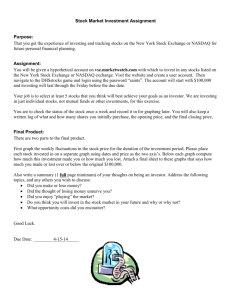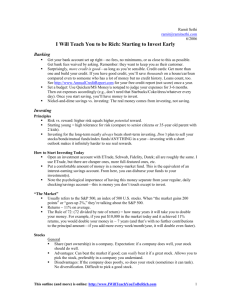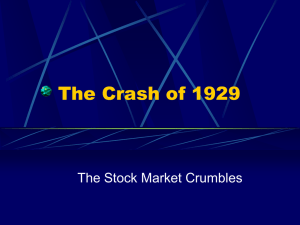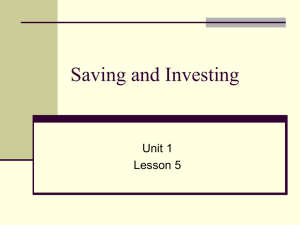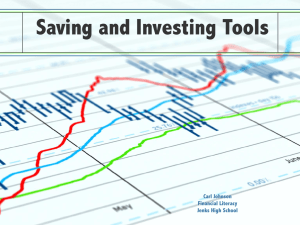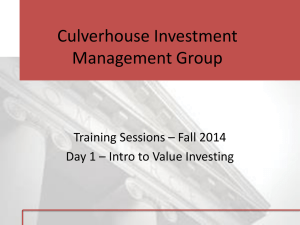UNSW-Value-Investing-Seminar
advertisement
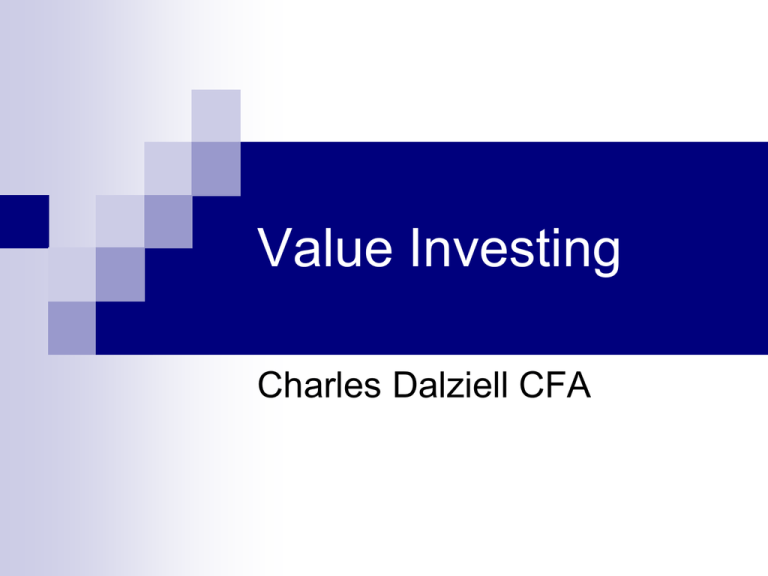
Value Investing Charles Dalziell CFA What is It? “The strategy of selecting stocks that trade for less than their intrinsic values. Value investors actively seek stocks of companies that they believe the market has undervalued. They believe the market overreacts to good and bad news, resulting in stock price movements that do not correspond with the company's long-term fundamentals. The result is an opportunity for value investors to profit by buying when the price is deflated.” Source: Investopedia Investing vs. Speculating Investing in stocks means only buying shares when you have a thorough understanding of the underlying business fundamentals of the company, as well as a sound basis for determining that stock’s value. Speculating is buying stocks without this knowledge Macquarie Research - Style Indices Value vs. Growth 18,000 Value Growth 16,000 14,000 12,000 10,000 8,000 6,000 4,000 2,000 2009 2007 2005 2003 2001 1999 1997 1995 1993 1991 1989 1987 0 Source: Macquarie Research Why does Value Work? Much of the downside is already priced in Value often gets free options on upside surprise Bird in the hand theory Negative sentiment doesn’t last forever Value avoids paying for high expectations Growth stocks get punished more than value stocks if they fail to deliver The market is generally short-term in focus Signs of Value But not a guarantee Low price/earnings ratio (PER) Low price/cash flow ratio (PCF) Low price/book value (PBV) High dividend yield Low price/NPV Solid balance sheet Typical Characteristics of Value Stocks Out of favour with the market Share price has been weak or has underperformed Problems are temporary or fixable The underlying business is well placed Demonstrating attractive value criteria Changing management Typical Characteristics of Value Investors Disciplined Patient Contrarian Courageous Thorough Focused Self belief Conservative Thinks like an owner Value Process Screen for Ideas Focus on your circle of competence Study the competitive landscape Evaluate the management Understand the financials Is the business a good one? Value the stock Is the stock cheap? Why? Act on your idea Don’t be too clever Valuation Models Art Rather than a Science Price/Earnings Ratio (PER) Price/Cash Flow EV/EBIT EV/EBITDA Discounted cash flow Price/Book Total Rate of Return (TRR) Most important inputs to models are Growth Rates and the Multiple or Discount Rate Typical Characteristics of a Good Business Solid track record High ROIC High margins Dominant market share Low cost producer Pricing power Brand recognition Capable management Minimal Government regulation Good Business vs. Good Stock A company can have a great business but be a poor investment if you pay too much Every business has a value. Some are more easily calculated than others. Every company has been or will be a value stock at some stage CSL Limited $45 $40 $35 $30 $25 $20 $15 $10 $5 2010 2008 2006 2004 2002 2000 1998 1996 1994 $0 Source: IRESS CSL Limited MBA PER Relative to S&P/ASX 300 (X) 2.6 2.2 1.8 1.4 1.0 Historical PER Relative MBA - 5 year average Broker - 5 year average 2010 2009 2008 2007 2006 2005 2004 2003 2002 0.6 Source: IRESS, MBA Misconceptions about Value Investing Value Investing is a myth No consideration is given to growth No emphasis is given to quality Stocks must have low PERs Great businesses are never good value Value investing is cigar butt investing Shortcomings of Value Investing Value traps Buying too early Selling too early Underperforming for long periods Telstra Corporation Limited Value Trap? $9 2000 PER: ~28x $8 $7 $6 $5 $4 $3 2010 PER: ~9x 2010 2009 2008 2007 2006 2005 2004 2003 2002 2001 2000 $2 Source: IRESS Disclaimer This presentation was prepared by Maple-Brown Abbott Limited (Maple-Brown Abbott) ABN 73 001 208 564, Australian Financial Service Licence No. (AFSL) 237296, is intended to provide general information only, and does not have regard to an investor’s investment objectives, financial situation or needs. The content does not constitute advice and should not be relied upon as such. Our presentation, including comments we make about individual stocks, is intended only to explain our approach to managing funds. In discussing individual stocks or other investments we do not make any recommendation or give any statement of opinion that is intended to influence anyone in making an investment decision. Investment advice should be sought in respect of individual circumstances.
